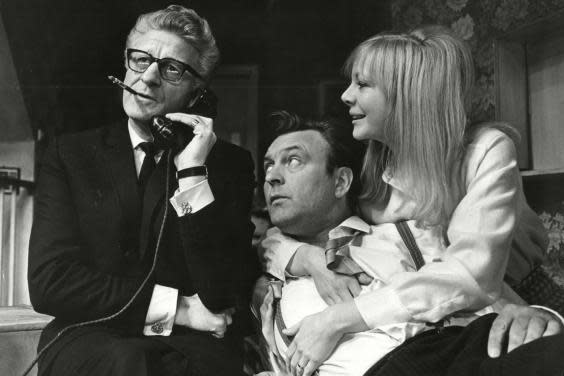Terence Frisby: Playwright who hit the big time with ‘There’s a Girl in My Soup’

Terence Frisby, who has died aged 87, acted on stage and screen, presented the children’s TV show Play School, was seen as the Manikin man in 1970s cigar commercials and scripted an early David Jason sitcom – but his greatest achievement was writing the stage hit There’s a Girl in My Soup.
It became the West End’s longest-running comedy to date when it opened at the Globe Theatre in 1966 and, after a transfer to the Comedy Theatre, finally closed in 1973.
The original production, Michael Codron’s first success as a producer, starred Donald Sinden as a celebrity chef trying to seduce a 19-year-old (Barbara Ferris) who has just split up with her boyfriend. In this play about sex and social mores, Sinden’s frequently used chat-up line is: “My God, but you’re lovely.” The independent, switched-on Ferris takes him aback with the response: “My God, but you’re corny.”
There’s a Girl in My Soup had begun as “Mr Danvers’ Downfall”, written by Frisby as an “anti-romantic” television play rejected by the BBC, which had asked him for a romantic comedy. He rewrote it, stage director Robert Chetwyn came up with the new title and, capturing the atmosphere of the Swinging Sixties, it ran in the West End for 2,547 performances.
Frisby earned £100,000 in its first year and even more as productions opened around the world, and he adapted it for a 1970 film version starring Peter Sellers and Goldie Hawn that won him a Writers’ Guild of Great Britain award. Its record London run was subsequently overtaken by the farces No Sex, Please – We’re British and Run for Your Wife.
Terence Peter Michael Frisby was born in New Cross, south London, in 1932 to Kathleen (nee Casely), a former jazz drummer who worked in a department store, and William, a railway worker.
He was brought up in Welling, Kent, but evacuated to Cornwall during the Second World War – an experience he dramatised in his award-winning 1988 BBC radio play Just Remember Two Things... It’s Not Fair and Don’t Be Late, which he regarded as his best work.
His later musical based on it was performed at Barnstaple’s Queen’s Theatre in 2004 but, later retitled Kisses on a Postcard, failed to get picked up by a producer who could take it to the West End. He wrote a 2009 book with the same title.
Frisby left Dartford Grammar School in 1949 and spent six years working as a tailor before training as an actor at the Central School of Speech and Drama (1955-57). While there, he saw John Osborne’s Look Back in Anger at the Royal Court Theatre – “a play which just knocked me out”, he said.
He started his career with the repertory company in High Wycombe (1957) and, until the late 1960s, acted and directed under the name Terence Holland, mostly at other rep theatres.
However, he did make his London debut as Charlie Pepper in Gentlemen’s Pastime at the Players’ Theatre (1958) and, as a writer, contributed satirical material to Peter Cook’s Establishment Club.

He also had a handful of roles on TV and a bit part in the film Carry on Cruising (1962), but his face was most familiar to younger viewers as a regular presenter of Play School during its first four years (1964-68).
As Terence Frisby, he wrote episodes of the private detective drama Public Eye (in 1965) and the fantasy adventure Adam Adamant Lives! (in 1966).
He switched to comedy with Lucky Feller (1975-76), starring David Jason as gauche Shorty Mepstead, running a plumbing business with his elder brother. It was the resurrection of a film script that never saw the light of day.
The writer had originally met Jason when the star’s brother, Arthur White, acted in Frisby’s first play, The Subtopians, in rep at Bromley in 1963. Unfortunately for Jason, the sitcom proved not to be his breakthrough. “Lucky Feller didn’t quite manage to flap its wings and fly,” he recalled, ruefully.
Frisby had greater success with That’s Love (1988-92), based on his 1977 Mermaid Theatre play It’s All Right If I Do It. Over four series, it followed the tangled marriage of a lawyer (Jimmy Mulville) and designer (Diana Hardcastle) with a rich widow (Liza Goddard) offering him more than a shoulder to cry on when secrets emerge about his wife’s past.
Frisby’s other London stage plays included The Bandwagon (Mermaid Theatre, 1969), with Peggy Mount as the matriarch of a family where all the women are pregnant, and Rough Justice (Apollo Theatre, 1994), starring Martin Shaw as a journalist on trial for killing his brain-damaged baby and Diana Quick as the prosecuting counsel.
His occasional screen acting roles included a short run as a banker in the final series (1976) of the popular BBC family haulage firm drama The Brothers.
In 1963 Frisby married model Christine Vecchione. Eight years later the couple divorced. Much of the fortune he amassed from There’s a Girl in My Soup disappeared as he spent 15 years fighting legal battles over the financial settlement and custody of their son Dominic (now a writer and comedian), recounted in his 1998 book Outrageous Fortune. Frisby was a founder member of fathers’ rights group Families Need Fathers in 1974 although he later became disillusioned with the organisation.
He is survived by his son.
Terence Frisby, actor, writer and director, born 28 November 1932, died 22 April 2020
Read more
Terry Hands: Artistic director of the Royal Shakespeare Company
Honor Blackman: Actor who starred in The Avengers and Goldfinger

 Yahoo News
Yahoo News 
